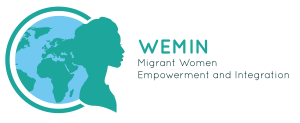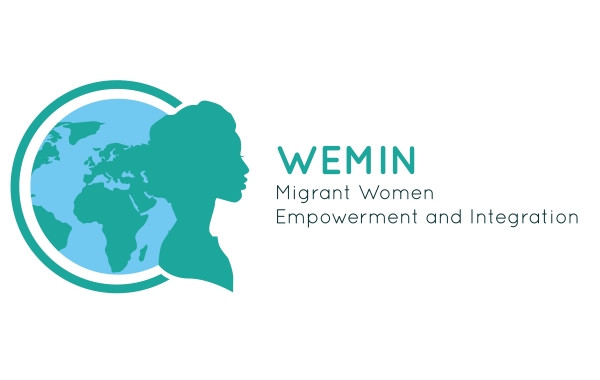
On the 31st of December 2019, the two-year AMIF project WEMIN: Migrant Women Empowerment and Integration came to its completion. Funded by the European Union’s Asylum, Migration and Integration Fund (AMIF-2016-AG-INTE / grant agreement no.776211), it was implemented successfully by partners coming from eight EU Member States (Greece, France, Italy, Spain, Portugal, Ireland, Germany and Sweden). It was coordinated by the DAISSy Research Group of Hellenic Open University (HOU), while the WEMIN activities in Greece were implemented in Athens in collaboration with project partner Olympic Training & Consulting Ltd.
The WEMIN project developed a pioneering model for the integration of migrant and refugee women (MRW) of all ages in the hosting communities of the partner countries. It combined, among others, training, empowerment and mentoring sessions, learning through art, production of guides (on best practices of migrants’ integration and on related policy-making), development of digital educational material (videos) and tools (electronic peer learning platform included), etc. More precisely, the following exploitable results were achieved by the WEMIN project:
Detailed description of 10 good practices in the field of social integration of migrant and refugee women (Guide)
The Guide of good practices on integration of migrants is regarded as a very useful tool for the organizations (NGOs included) dealing with such topics. The good practices identified at national level by all the partners of the consortium were analyzed and included in the list of concrete actions to be carried out in favor of the target group.
The Social Integration of Migrant and Refugee Women – A Guide for Policy Makers
A Short Policy Guide (SPG) was developed with all the significant information presented in the Good Practice Guide in a more cohesive and dense way. It includes scenarios and recommendations on MRW integration. The feedback received from external associated organizations has already been very positive, for they regarded it as a very useful tool for relevant policy-making.
Booklet of “MRW stories of change”
The booklet gathers the testimonies of MRW who have participated in WEMIN activities in the partner countries. Each story is different: some women share their experiences from the integration process in the host communities; others are focused on how the WEMIN project has helped them to improve their lives and there are even some stories where women talk about their past. This document aims to disseminate these women’s voices around Europe, and therefore to contribute to their empowerment.
Peer learning methodology and training materials used during the interventions
A detailed collection of existing training material (in the fields of free language learning software, vocabulary related to social and cultural life, history of the host country, core values of host country, social and cultural life in host country, the European dimension, principles of intercultural communication) has been completed; the material has been uploaded on the online peer learning platform. The WEMIN guidelines for training and the peer learning methodology are a useful basis for such future activities.
Digital training material (videos and e-learning material)
All the digital training material produced during the WEMIN project implementation, will be used in future training activities accordingly. Since, it is uploaded on the WEMIN platform it can be easily exploited by any other interested body in the world, from now and onwards. Using the illustration as communication language proved to be very challenging and interesting.
Methodology and content guide of empowerment and mentoring
The empowerment and mentoring sessions dealt with topics such as job seeking, education system, voting and the electoral system, further education opportunities etc. The methodology implemented by the WEMIN project has been already used in other new projects and initiatives of the partner organizations and the networked stakeholders e.g. within public schools by helping high level migrant students through volunteer tutoring services, during events and info-days as useful tools for teachers, cultural mediators and social workers in reception centers for asylum seekers and refugees, etc. The digital training and empowerment material along with their application guidelines can also be found in the WEMIN peer learning platform.
Workshop plan (methodology and artistic pieces)
The cultural workshops of the WEMIN project aimed to bring together migrant, refugee and local women; they triggered ideas to the women involved for artistic or craft creations. Furthermore, the creations from the cultural workshops turned out to be lovely art pieces. With this regard, they have been exploited as content for exhibitions and/or as content for decoration. The methodology applied for the implementation of the cultural workshops proved to be effective.
Workshop scrapbooks
Impressive scrapbooks have been produced by the partners that correspond to the experiences shared by the MRW and local women involved in the cultural workshops. It is regarded as a tool that matches perfectly with the “booklet of the MRW stories of change” and an excellent basis to showcase the potential of migrant communities and the fruitful results of peaceful co-existence and co-creation within society.
Online peer learning platform
It has played a central role in empowering the WEMIN community (MRW and the host communities) in general, while also it has been used as a focal point for networking, synergy and supporting peer learning. Digital material, communication and other platform tools have always been universally available through desktop or mobile devices, which was critically helpful, especially for the WEMIN target group. Because of the platform modern and friendly appearance, it has been used not only by migrant women and host communities but also by other smaller or larger groups with common interests, like mediators, volunteers etc.
All the WEMIN results and outcomes were presented during the big international closing conference that was organized on 8th and 9th December 2019 by the DAISSy research group of HOU in Athens (Greece). The conference triggered the interest of more than 150 participants, among them scholars, experts and practitioners, representatives of authorities, institutions, organizations and associations, active citizens, and more generally anyone involved in the study, research and practice in the fields of migration, migration policy, empowerment and social integration of refugees, as well as related topics. MRW being beneficiaries of the project actions, attended the conference and its workshops and presented the valuable experiences they have gained through their active involvement in the WEMIN project.
The WEMIN project enhanced the smooth MRW integration into the European cities where they live, enabling them to play a leading role and act as integration multipliers within their families and their circle of contacts. At the same time, the WEMIN actions offered opportunities to stimulate dialogue, intercultural relations and exchanges, while the online peer learning platform was been used to promote learning and networking.
It is noteworthy that the WEMIN project has developed results and tools that can be further exploited and contribute to a long-term impact beyond its implementation period. It is envisaged that the exploitation process will lead to the delivering of new services for MRW, the creation of new teaching and learning opportunities for them, so that to support their social, cultural, political and economic integration into their host country society. The project platform will be maintained by HOU-DAISSy beyond the completion of the project (https://culturalmediators.eu/wemin-platform/register/). This allows all interested bodies to use it e.g. staff of oganisations working for the benefit of migrants and refugees integration (such as social workers, cultural mediators, teachers/tutors, etc.).
You can be informed in detail about the WEMIN project and access its outputs by visiting www.wemin-project.eu or by following #WEMIN.

